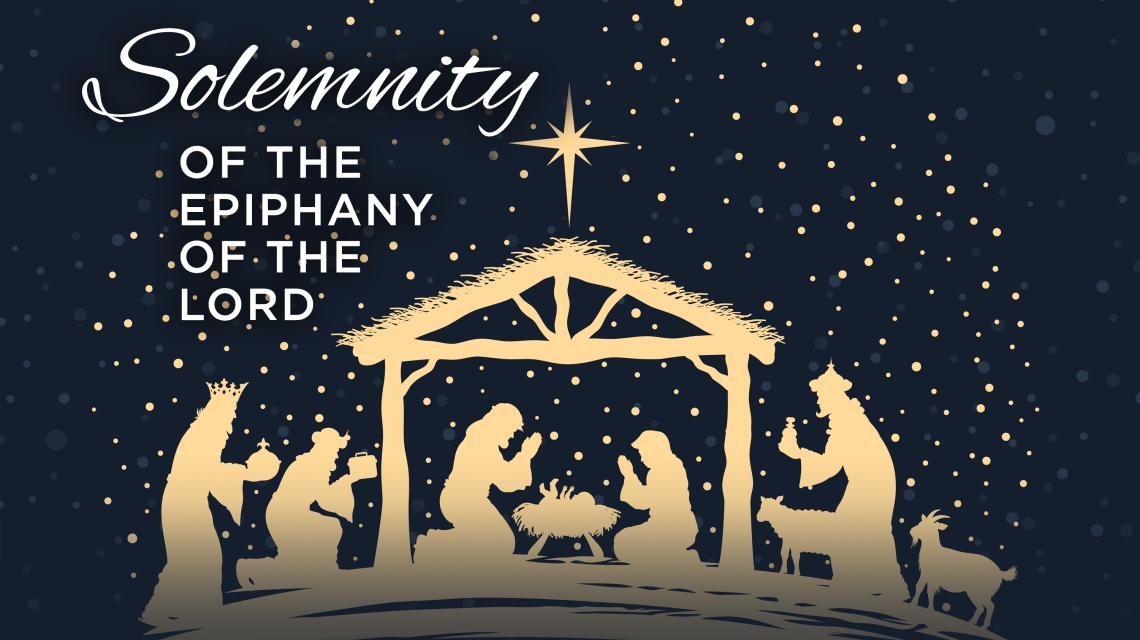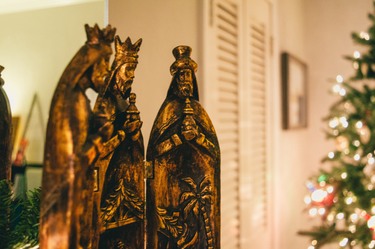Solemnity of the Epiphany of the Lord

The Solemnity of the Epiphany of the Lord commemorates the visit of the magi to worship the baby Jesus as told in the Gospel of Matthew: “Behold, magi from the east arrived in Jerusalem, saying, ‘Where is the newborn king of the Jews? We saw his star at its rising and have come to do him homage.’”
The word “epiphany” comes from the Greek epiphainen, which means "to manifest," “appear,” or “make known.” The Feast of the Epiphany celebrates the revelation of Jesus, the Son of God, to the world. The magi, or kings, or astrologers, or seekers from the East, stand in for all the peoples of the earth, for Jesus comes not just for one group of people but for all.
“The Epiphany is the manifestation of Jesus as Messiah of Israel, Son of God and Savior of the world. The great feast of Epiphany celebrates the adoration of Jesus by the wise men (magi) from the East, together with his baptism in the Jordan and the wedding feast at Cana in Galilee. In the magi, representatives of the neighboring pagan religions, the Gospel sees the first-fruits of the nations, who welcome the good news of salvation through the Incarnation.” CCC 528
Although the magi have been given names, Caspar, Balthazar and Melchior, the Gospel doesn’t actually include their names or even that they are kings. Other than the fact that they are from the East, even their countries of origin aren’t known.
Origins of the Church's Celebration
The celebration of the Epiphany dates back to the early centuries of the Church. Originally, it included the celebration of Christ’s birth. It wasn’t until 336, under the reign of Emperor Constantine, that the Church began celebrating Christmas separately, on December 25, creating the 12 Days of Christmas which continued through the Feast of the Epiphany. While the actual date of the Feast of the Epiphany is January 6, in the United States, the celebration of the feast is transferred to the weekend closest to that date. This Christmas season, it will be on January 4, 2026.
The Gifts of the Magi
In many European cultures, the Feast of the Epiphany is celebrated as richly as Christmas, with gifts exchanged, since it is the day when the Magi presented their gifts of gold, frankincense, and myrrh to Jesus.
 “These gifts can be seen as representing this threefold mission of Christ and the Christian,” explains Father Mark Nolette in his blog, The Anchorite.
“These gifts can be seen as representing this threefold mission of Christ and the Christian,” explains Father Mark Nolette in his blog, The Anchorite.
Frankincense
"Frankincense was often used in divine worship. It becomes, then, an apt symbol of Christ as priest. It is also a symbol of Christ’s divinity. Note that the magi prostrate themselves before the child Jesus and do him homage. In Matthew’s Gospel, such words are only used for God or Jesus. No one else. This is divine worship.
Myrrh
“Myrrh was often used in burials, especially of prominent people who could afford it. Because of this, Christians often interpreted this gift as referring to the coming suffering, death, and resurrection of Jesus. In this sense, myrrh can be seen as representing Christ as prophet. We think of the Suffering Servant prophecies of Isaiah that pointed to this. We also recall the words of Simeon to Mary at the circumcision of Jesus in the Temple.
Gold
“Gold has long been seen, in many cultures, as a gift for kings, or denoting kingship. It is easy to see how this gift points to the kingship of Christ. In many places in Scripture, from Old Testament references like Psalm 72 to descriptions of the New Jerusalem in the Book of Revelation, we see references to gold and other precious materials being offered to God or to the Messiah. It’s interesting to see how Psalm 72 connects the offering of gold to the king’s mission to bring about justice for his people. The gift of mercy and justice is inseparable from Christ’s role as king and from our role as kings in service to the kingship of Christ.”
A fourth gift?
Father Nolette says the Magi actually give us a fourth gift as well, the witness of their actions. He says they show us that we will often find God in places and in people where we are not expecting him, that we must have a willingness to change and to open ourselves up to God, and that faith requires a commitment and should be shaped by the Scriptures as interpreted by the living tradition of our church.
Epiphany Resources & Events
Blessing of a Home on The Epiphany
Epiphany Family Activities (External Link)
Epiphany Reading of the Day (External Link)
Epiphany Reflection - Father Anthony Lawir
Epiphany Reflection (Harvest magazine) - Fr. Kevin Upham
Epiphany Reflection - Fr. Roland Berngeh
Lectio Divina Epiphany - English
Lectio Divina Epiphany - Spanish
What is the Solemnity of the Epiphany? - EWTN (External Link)









